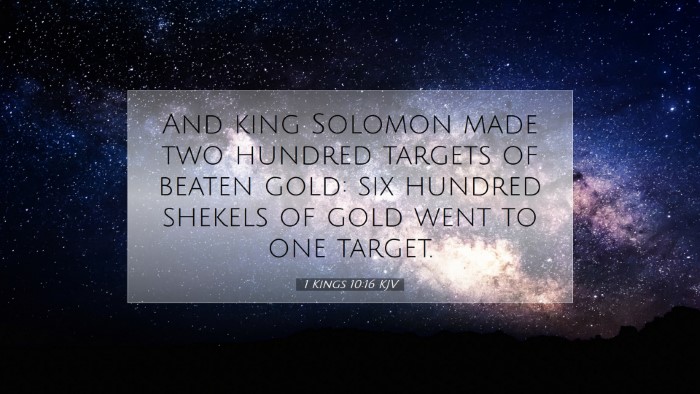Commentary on 1 Kings 10:16
Verse: "And king Solomon made two hundred targets of beaten gold; six hundred shekels of gold went to one target."
Introduction
This verse from 1 Kings 10:16 provides a glimpse into the grandeur and splendor of King Solomon's reign. In this commentary, we will explore the historical context, the significance of gold, the symbolism of the targets, and the implications for leadership and wealth. Insights will be drawn from renowned public domain commentaries to enrich our understanding.
Historical Context
King Solomon, known for his wisdom and wealth, presided over Israel during a time of great prosperity. The mention of "targets of beaten gold" reflects the opulence that characterized his reign. Solomon's achievements were often paralleled by his building projects, including the Temple in Jerusalem and his own royal palace, both of which were adorned with precious materials.
Matthew Henry's Commentary
Matthew Henry emphasizes that the gold used for these targets signifies not only wealth but also Solomon's desire to display his glory and power. The precision in the weight of gold used for each target (six hundred shekels) indicates a calculated approach that seeks to reflect his status as a powerful king. Henry notes that such displays are often indicative of a ruler's success and the extent of his dominion.
Albert Barnes' Insights
Albert Barnes provides additional dimensions to the wealth displayed through these golden shields. He suggests that the number of targets (two hundred) may suggest a military context, signaling Solomon's preparedness and strength. These shields might have been used in ceremonial displays, serving to instill awe both among his own subjects and foreign dignitaries.
Adam Clarke's Analysis
Adam Clarke elaborates on the craftsmanship involved in creating such targets. He points out that the term "beaten gold" indicates a laborious process of metalworking that highlights the exceptional skill of artisans in Solomon's court. Furthermore, Clarke reflects on the utility of these targets, which stood not only as defensive instruments but also epitomized royal prestige and the glory of Israel under Solomon's rule.
Significance of Gold
The use of gold has multifaceted significance in biblical literature. Gold represents divine favor, purity, and the glory of God's creation. It is a material that symbolizes wealth and majesty, fitting for a king endorsed by God. However, it also raises questions about the balance of material wealth and spiritual fidelity, a recurring theme in the narratives surrounding Solomon.
Gold as a Symbol
- Divine Favor: Gold was often associated with God's blessing, which is evident in the wealth bestowed upon Solomon following his prayer for wisdom.
- Earthly Majesty: The heavy use of gold conveys the tangible expression of a ruler's power and the splendor of the kingdom.
- Potential Pitfall: This emphasis on wealth also serves as a caution. Solomon's eventual downfall was partly attributed to his accumulation of riches, leading to idolatry and disobedience.
The Targets: Symbolism and Function
The reference to targets or shields made of gold transcends mere military function. These objects serve as symbol-laden artifacts that embody royal authority, protection, and the glory of Israel.
Military Readiness and Royal Power
- Display of Strength: The two hundred targets symbolize Israel's military prowess. Solomon sought to project strength to deter enemies and secure peace.
- Ceremonial Significance: The lavish nature of these targets suggests participation in royal ceremonies, elevating the king's status in the eyes of his subjects and neighboring nations.
Spiritual and Theological Reflections
This recounting of Solomon's golden targets invites deeper theological reflection. The interplay of wealth, power, and the responsibility of leadership is paramount in the biblical narrative.
Leadership and Wealth
- Stewardship: Biblical leadership calls for wise stewardship of resources. Solomon's wealth should have been used to further God's purposes, not simply for personal glory.
- Accountability: Leaders are accountable to God for how they utilize the wealth entrusted to them. Solomon's life serves as a cautionary tale about the risks of losing sight of God's priorities.
- Reflection on the Church: Present-day leaders can draw parallels from Solomon's example regarding the use of resources within faith communities, emphasizing the importance of eternal over temporal investments.
Conclusion
In 1 Kings 10:16, we witness a snapshot of the grandeur of Solomon's reign, encapsulated in the creation of golden targets. This account leads us to reflect on broader themes of wealth, leadership, and divine favor.
Ultimately, it invites pastors, students, theologians, and scholars to engage with the complexity of biblical narratives that intertwine material riches with spiritual responsibilities. As we explore the life of Solomon, we are prompted to consider how our own pursuits of success and wealth align with God's intended purposes for our lives and our communities.


